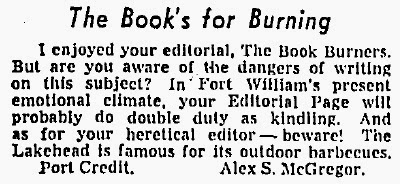 |
| Catherine Seppala 1907 - 1975 RIP |
Welcome to the working week.
Looking over past Freedom to Read Week posts, I see I've written about personal heroes – Jean-Charles Harvey, Irving Layton, Norman Levine, F.R. Scott, and Dana Porter – while casting much more light on villains like Howard Burrell, Len Wynn, Raoul Mercier, Premier Maurice Duplessis, Fr. Harrigan, Col. Colin Harding, Sgt. John Watson, Det.-Lt. Lucien Quintal, and the forbidden books card catalogue of Lt.-Col. (Ret'd) John Merner.*
It probably doesn't reflect well on me that I focus so much on those who seek to suppress… and here I am doing it again with Catherine Seppala, once Mayor of Fort William, Ontario.
There's a good deal to admire about Mrs Seppala: she was a conservationist, a dedicated volunteer, a city councillor and Chair of Fort William's carnival queen contest.
 |
| The News-Courier (Charleston, SC) 10 January 1956 |
In 1959, she was elected Fort William's first and only female mayor. Sadly, the accomplishment is marred by abuse of power. It all began when the newly elected mayor visited the offices of the Central News Company and "suggested" to manager Henry Batho that he remove all copies of Lady Chatterley's Lover from city news stands. So persuasive was Mrs Seppala that Mr Bathos not only removed the book from sale, but received permission to use the city's incinerator in burning all seven hundred or so copies.
 |
| The Globe & Mail, 13 October 1959 |
Mr Bathos later told The Globe & Mail that he had feared a lawsuit. The same report has Mayor Seppela admitting that she hadn't actually read the Lady Chatterley's Lover, but she fully intended to one day. Ignorance in no way prevented her from deeming the novel as "a dirty rotten piece of filth", "the dirtiest thing ever put into print." "I will not hesitate to enforce a ban", she warned.
Condemnation followed, the most noteworthy coming in not one but two Globe & Mail editorials. Here's the second, published 14 October 1959:
 |
| (cliquez pour agrandir) |
 |
| The Globe & Mail, 7 October 1959 |
 |
| The Globe & Mail, 19 October 1959 |
 |
| The Globe & Mail, 27 October 1959 |
How far Mayor Seppala was willing to go is anyone's guess. A few months into the crusade she was struck by ill health, which in turn led to her resigning the mayoralty.
 |
| The Globe & Mail, 7 October 1959 |
* No light will be cast on Barrick Gold Corp. I rush to add that Peter Munk, Anthony Munk, Howard L. Beck, William Birchall, Jamie C. Sokalsky and Brian Mulroney are mighty fine people. Really.
Related post:


























